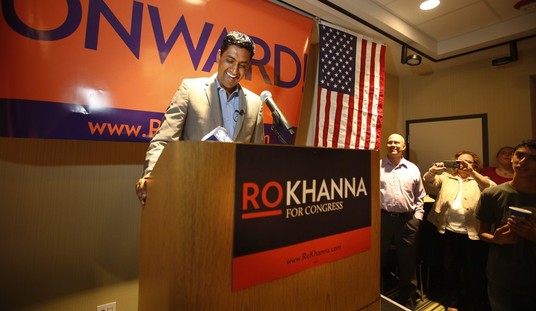This White House’s relationship with Israel, and particularly Prime Minister Benjamin Netanyahu, has always been strained, but it is fair to assume today that American relations with the West’s closest ally in the Middle East are downright hostile.
The White House is making it clear for all interested observers that they do not believe close relations with the Israeli government are a priority. AllahPundit’s dissection of an interview an administration official gave The Atlantic’s Jeffrey Goldberg, in which Netanyahu was ungraciously described as “recalcitrant, myopic, reactionary, obtuse, blustering, pompous, and ‘Aspergery,’” is a must-read.
AllahPundit observed that the unnamed administration in that piece took credit for preventing Israel from attacking Iran’s nuclear facilities, called Netanyahu a “chickensh*t” for not pulling the trigger despite Washington’s objections, and mocked Jerusalem for now being unable to successfully eliminate Iran’s hardened atomic weapons facilities. Essentially, the administration is taking credit for saving the Iranian nuclear program.
Logically, this is indefensible. The president has repeatedly assured the public that his administration’s goal was to avoid presiding over the nuclearization of Iran. Even if you suspect that he is not fully committed to that outcome, it is safe to assume that he is dedicated to avoiding the scorn and derision of historians who will look back on his presidency as one which allowed the volatile Middle East to grow exponentially more dangerous. But the administration’s decision makes sense when viewed within the framework of its determination to shift America away from its alliance with Israel and towards friendlier relations with Tehran.
“[R]ecent months have ushered in a change as the two countries have grown into alignment on a spectrum of causes, chief among them promoting peaceful political transitions in Baghdad and Kabul and pursuing military operations against Islamic State fighters in Iraq and Syria, according to these officials,” The Wall Street Journal reported on Tuesday.
It is not merely the Mullahs in Tehran that are enjoying this new thaw in Washington. Organizations the State Department lists as terrorist groups which are sponsored and protected by Iran, Hamas and Hezbollah, are also finding America is markedly less hostile toward them these days.
The Obama administration also has markedly softened its confrontational stance toward Iran’s most important nonstate allies, the Palestinian militant group Hamas and the Lebanese militant and political organization, Hezbollah. American diplomats, including Secretary of State John Kerry , negotiated with Hamas leaders through Turkish and Qatari intermediaries during cease-fire talks in July that were aimed at ending the Palestinian group’s rocket attacks on Israel, according to senior U.S. officials.
…
U.S. intelligence agencies on a number of occasions have provided tips on terrorist threats to Lebanese security agencies that are known to be close or under the sway of Hezbollah, said U.S. and Arab officials. Among them is the intelligence unit, known as the General Security Directorate, which has arrested Nusra Front cells in Beirut and northern Lebanon over the past two years.The Obama administration’s indirect diplomatic engagement with Hamas has unnerved Israel and allied Arab states. Washington maintains a policy of no direct talks with the Palestinian group, which is designated a terrorist organization by the U.S. and European Union. But Mr. Kerry and other U.S. officials regularly conveyed messages to Hamas’s political chief, Khaled Meshaal, through Qatari and Turkish diplomats during cease-fire talks this summer.
Aside from being dangerous policy, this smacks of naiveté in pursuit of ephemeral expediency. This administration needs Iran to relieve them of the hard work of defending and securing a weak Iraq. Iran’s nuclear program cannot be confronted while at the same time the administration leans on Tehran to take on more responsibilities in its destabilized neighbor.
But this is not a viable strategy for the United States to pursue in the long-term. The weaknesses of American diplomatic overtures to Iran at Israel’s expense are exposed by the very name which the Wall Street Journal gives this policy of rapprochement: Détente.
Détente with the Soviet Union was also a policy of convenience crafted by the Nixon administration. It was designed with the aim of mollifying the Soviets in order to facilitate a speedy American withdrawal from Vietnam. It enjoyed some limited successes, mostly in the form of arms reduction treaties, but it was ultimately doomed to collapse.
Détente quite nearly disintegrated when the 37th President “opened” China, allowing Western governments to exacerbate the widening Sino-Soviet split and igniting a simmering civil conflict within the communist world. It utterly dissolved after the Soviets invaded Afghanistan and, after the election of Ronald Reagan, the post-Détente Cold War landscape of 1981 to 1983 may have been the most dangerous period of that entire conflict.
America sacrificed a troublesome and imperfect but nevertheless stalwart ally in Saigon in order to achieve a temporary diplomatic victory with Détente. The reanimation of this long-dead policy, and Washington’s desire to sacrifice Jerusalem for the fleeting benefits associated with warmer relations with Tehran, is disturbingly shortsighted.







Join the conversation as a VIP Member